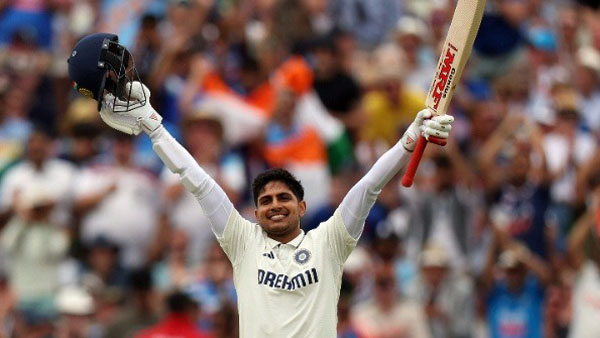By Dipak Kurmi
In the cyclical theatre of Indian cricket, where legacy is both a burden and a muse, a generational shift has taken full shape. Shubman Gill, once a teenager measuring himself against the towering achievements of Virat Kohli in domestic age-group cricket, has now stepped into the shoes of the master with an authority that history will remember. With a sublime 269-run knock at Edgbaston in the second Test against England—a score that poetically mirrors Kohli’s Test cap number—Gill has not only scripted his personal masterpiece but also redefined India’s cricketing future.
What makes this moment doubly significant is that it coincides with the full retirement of both Virat Kohli and Rohit Sharma from the Test format. Their absence has marked a symbolic closure of an era dominated by flamboyance, grit, and world-class consistency. In their place steps Gill—not with a loud proclamation, but a measured assertion, reflective of a new temperament. This is not a case of coronation by default, though contenders were few. It is an arrival, patiently sculpted and now explosively unveiled.
From Prince to Monarch
Gill’s elevation to captaincy wasn’t universally hailed as inevitable. In fact, months ago, even Rohit Sharma had candidly admitted, “The boys aren’t ready yet” when asked about leadership successors. That remark lingered, casting a shadow of doubt around Gill’s readiness. The unveiling of his new bat for the England series, boldly stamped with the moniker “prince”, was met with quiet derision in cricketing circles—an apparent signal of misplaced self-belief. But just two Tests into his reign, the prince has assumed the throne not with proclamations, but performance.
And what a performance it was. With India struggling at 211 for 5 on a placid Edgbaston pitch—after a conservative team selection that omitted Jasprit Bumrah and Kuldeep Yadav—India’s prospects looked grim. Critics, including former England captains Mike Atherton and Nasser Hussain, sharpened their knives. “Captaincy by committee,” some said. “A lack of aura,” said others. Gill, however, responded with bat in hand, crafting a flawless 269 that fused elegance, concentration, and quiet fury.
The knock was more than statistical superiority—it was an act of leadership. His double hundred came not in a dead rubber, but in a must-win situation after a disappointing loss in the first Test at Headingley. That loss, by five wickets, was bitter—especially after India had dominated large parts of the match. Former coach Ravi Shastri called the defeat “a tough pill to swallow,” emphasizing how difficult it is to mentally recover from such a game. But India did, and it did so under Gill’s captaincy.
A Captain’s Composure
In his post-match interaction with Nasser Hussain, Gill appeared unflappable. His words, like his batting, were measured, calm, and grounded. “He takes it one game at a time,” Shastri remarked later. “And for me, that’s one of the most positive things to come out for India.” That temperament, essential for Test match captaincy, is beginning to reflect in his batting as well. Unlike in Australia earlier this year, where he failed in key moments, Gill now appears capable of resisting temptation and weathering pressure.
His 269 is the highest score by an Indian captain in England, and more importantly, it came when his team needed it the most. From 211 for 5, Gill shepherded the lower order and built a formidable total that not only revived India’s chances in the match but also broke England’s psychological grip on the series. His innings wasn’t a solitary act—it was a statement of capability and resilience.
The Supporting Cast
While Gill’s masterclass dominated headlines, India’s bowling unit quietly laid the foundation for the historic 336-run victory—the first-ever Test win by an Asian side at Edgbaston. Jasprit Bumrah’s absence could have crippled India’s attack, but instead, it paved the way for Akash Deep’s breakout performance. The 28-year-old fast bowler, in only his second Test, delivered a remarkable ten-wicket haul—four in the first innings and six in the second. His disciplined line and unrelenting control offered India the rare luxury of pressure from both ends.
Alongside him, Mohammad Siraj and Prasidh Krishna took up the mantle, sharing the remaining wickets and ensuring that England never gained momentum. The trio accounted for 17 of the 20 English wickets in the match—an extraordinary statistic that underscores both the depth and potency of India’s pace arsenal. As Shastri noted, “What this attack does now is give you control. There are no easy runs.”
With Bumrah set to return for the third Test at Lord’s, the Indian attack becomes even more formidable. “England’s style of play will be tested now,” Shastri warned, adding that their current bowling unit looks “pretty ordinary” on good surfaces. For a team known for its aggressive ‘Bazball’ approach, facing this confident, multidimensional Indian bowling lineup could pose a challenge they’re unprepared for.
Turning the Series Around
India’s win at Edgbaston has levelled the series 1-1 and significantly shifted the momentum. More than just a statistical tie, it has mentally reshaped the contest. After the first Test, England held the edge, and India’s conservative tactics were being ruthlessly dissected. That criticism wasn’t unjustified. Choosing to rest Bumrah and Kuldeep Yadav raised eyebrows, particularly after a narrow loss in the previous game. It seemed to suggest timidity at a moment that demanded boldness.
But the gamble paid off, not because the plan was flawless, but because the team showed grit and discipline in execution. India dominated the second Test almost from the second day onwards. As Shastri rightly observed, “India has dominated 90 percent of the 10 days of Test cricket in this series so far.” That kind of sustained supremacy in England is rare, especially for visiting sides.
A New Chapter
Gill’s rise signals the beginning of a new narrative in Indian cricket. His journey—from obsessively tracking Virat Kohli’s age-group scores to now surpassing Kohli’s highest Test score as a captain—encapsulates the dream arc of Indian cricket’s generational churn. As a batsman, he has already impressed in white-ball formats; now, he is blossoming as a red-ball stalwart. As a captain, his calmness, tactical maturity, and self-belief hint at longevity.
Teenagers across India, once like the young Gill who idolised Kohli, will now be looking up to him—studying his scores, emulating his strokeplay, and dreaming of walking his path. Cricketing monarchies don’t pass peacefully. They are seized with knocks like these—timely, magnificent, and transformative. The prince is no longer waiting. He has arrived. The crown, once heavy with the legacies of Tendulkar, Dhoni, Kohli, and Rohit, now rests on younger shoulders—with poise and purpose.
And as India marches into the Lord’s Test, reinvigorated and ready, it is clear that the baton has been passed—not in whispers, but in a roaring declaration at Edgbaston. The era of Shubman Gill has begun.
(the writer can be reached at dipakkurmiglpltd@gmail.com)




